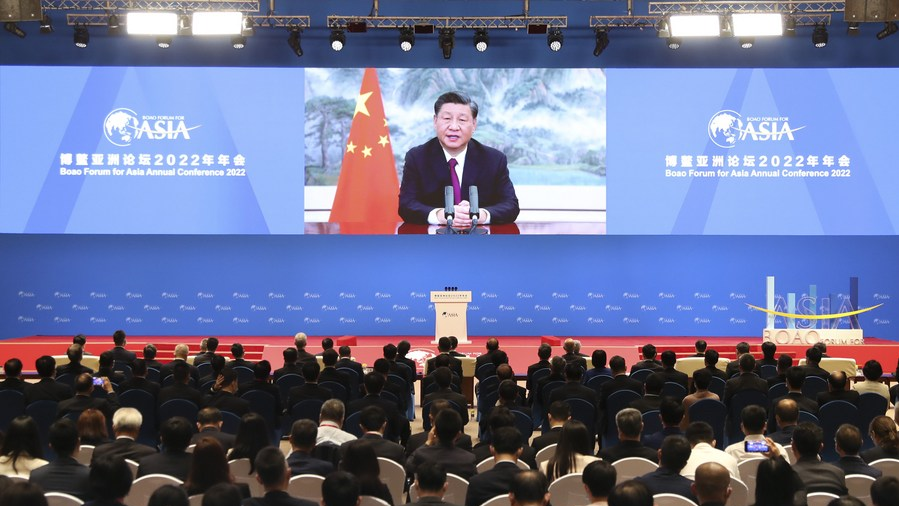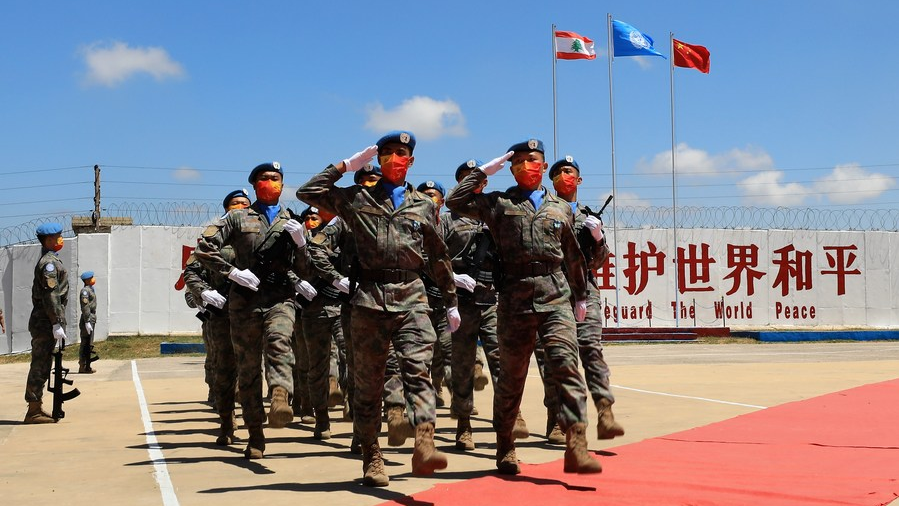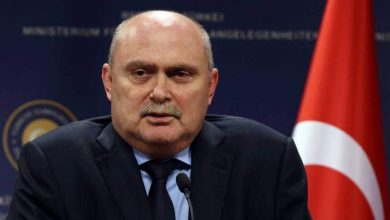How China advances Global Security Initiative for shared development

[ad_1]
One of the defining features of Chinese modernization is its commitment to peaceful development.
China has repeatedly pledged to strive to safeguard world peace and development as it pursues its own development.
With the global security environment becoming increasingly complex as a result of climate change, the pandemic and geopolitical conflicts, the pursuit of an effective security approach has become a pressing concern demanding swift resolution.
To that end, Chinese President Xi Jinping proposed the Global Security Initiative (GSI) at the opening ceremony of the Boao Forum for Asia Annual Conference 2022. The GSI Concept Paper was released in February 2023, showcasing China’s dedication to upholding world peace and its determination to ensure global security.

Chinese President Xi Jinping delivers a keynote speech via video at the opening ceremony of the Boao Forum for Asia Annual Conference 2022, April 21, 2022. /Xinhua
Chinese President Xi Jinping delivers a keynote speech via video at the opening ceremony of the Boao Forum for Asia Annual Conference 2022, April 21, 2022. /Xinhua
The GSI in action
Since the launch of the GSI, China has taken multiple steps to underscore its commitment to global peace and sustainable development.
One of the highlights came with the historic thaw in the relationship between Saudi Arabia and Iran this March.
After years of open hostility, the two countries agreed to restore diplomatic ties following talks facilitated by China, a significant development for the two nations and a boon to the security and stability of the Middle East.
In the wake of the Riyadh-Tehran rapprochement, reconciliatory steps have taken place to break several diplomatic impasses and end long-running feuds in several hotspots in the Middle East.
For example, Syria, after being ostracized for 12 years, made a comeback at the Arab League (AL) Summit held in the Saudi city of Jeddah this May. In addition, Egypt and Türkiye agreed to upgrade the two countries’ diplomatic relations and exchange ambassadors.
This “wave of reconciliation” testifies to the irreplaceable role of dialogue and consultation in promoting peace and stability.
“War and sanctions are no fundamental solution to disputes; only dialogue and consultation are effective in resolving differences,” according to the GSI Concept Paper.
“We need to achieve peace through negotiation and dialogue, as well as through the United Nations (UN) framework, which is what the GSI is focused on,” Anil Sooklal, deputy director-general for Asia and the Middle East at the Department of International Relations and Cooperation (DIRCO) of South Africa, told China Media Group (CMG).
China also published a position paper in February to help achieve a political settlement of the Russia-Ukraine conflict.
In the paper, China put forward a 12-point proposal to end the Ukraine crisis and affirmed that dialogue and negotiation are the only viable routes to peace.
The peace proposal has been welcomed by many countries. Stephane Dujarric, spokesperson for UN Secretary-General Antonio Guterres, hailed the position paper as “an important contribution.”

Chinese peacekeepers march at a medal parade ceremony in Hanniyah village, southern Lebanon, July 1, 2022. /Xinhua
Chinese peacekeepers march at a medal parade ceremony in Hanniyah village, southern Lebanon, July 1, 2022. /Xinhua
Shared security
From counterterrorism and digital governance to food security and climate change, China has played a pivotal role in promoting common security.
Since the UN Food and Agriculture Organization (FAO) launched the South-South Cooperation Program in 1996, China has been actively involved. It has donated $130 million to the FAO since 2009.
The Chinese government has also provided considerable agricultural technical assistance to developing countries. To date, China has dispatched more than 1,000 Chinese experts and technicians to Africa, Asia, the Caribbean and the South Pacific through the FAO.
With regard to peacekeeping, China has sent over 50,000 personnel on peacekeeping missions in the last three decades.
China ranks first among the permanent members of the UN Security Council in terms of the number of peacekeepers dispatched and is the second-largest funding contributor to the UN’s regular budget and peacekeeping assessment.
Escort fleets dispatched by the Navy of the Chinese People’s Liberation Army have safely escorted more than 7,100 vessels in the Gulf of Aden and waters off Somalia, over 50 percent of which were non-Chinese vessels, helping to maintain security on important international waterways.
As Chinese State Councilor and Minister of National Defense Li Shangfu said at the 11th Moscow Conference on International Security, the GSI advocates common, comprehensive, cooperative and sustainable security and promotes a new security path featuring dialogue over confrontation, partnership over alliance, and win-win over zero-sum, which the international community has warmly echoed.
[ad_2]
Source link





